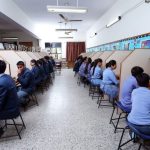
Established
1933Type
Board
CBSEOverview
Modern School is a co-educational day-cum-boarding school affiliated with the Central Board of Secondary Education (CBSE). It was established in 1920 in a mansion belonging to Sultan Singh, located in Daryaganj, New Delhi. It was established with a vision to impart a combination of traditional Indian system of education and modern educational techniques. Sultan Singh’s son Raghubir Singh founded the school to provide quality education and to foster holistic all-round development of children.
On January 4, 1933, the school building was formally inaugurated in the presence of students, teachers, and managers by Sobha Singh, a prominent builder and architect who was involved in the construction of numerous famous buildings in Delhi.
Campus
The modern School campus spans 27 acres of land and is flanked by Maharaja Ranjit Singh Marg and Barakhamba Road in central New Delhi.
The main school building was designed by C.G. and F.B. Blomfield, architects on the team designing the imperial capital of New Delhi. The white and red aesthetic of the Edwardian classical building at Modern School resembles many Delhi structures of the period. It is now classified as a heritage structure exemplifying British colonial architecture.
Modern school provides children with the best sporting equipment Delhi. It is the only school to have an Olympic-size pool as well as two grounds where the games such as football, basketball, volleyball, tennis, hockey and cricket can be played. The school also houses sports facilities for athletics, gymnastics, squash, badminton, horse riding, table-tennis, etc.
Academics
Modern School offers subject combinations (English, Hindi, Sanskrit/French/German/Spanish, mathematics, general science, social studies, computer science & applications) prescribed by the Directorate of Education, Delhi for classes VI-VIII.
The curriculum for classes IX and X is prescribed by the Central Board of Secondary Education. Subjects offered include English, language (Hindi / Sanskrit / French / Spanish / any other language), mathematics, science with practicals (physics, chemistry, biology), social studies (history, geography, economics, civics), any one socially useful productive work (SUPW), physical and health education and computer science & applications.
For classes XI and XII, as per the CBSE guidelines each student is required to opt for one compulsory language at the core level along with four electives. The school offers three streams; Science, Humanities and Commerce. Students are prepared for the All India Secondary School Exams (class X) and the All India Secondary School Certificate Examination (class XII).
Head of Institute
Dr. Vijay Dutta
General Information
 Min Fee
Min FeeNA
 Max Fee
Max FeeNA
10 years
 Library
LibraryYes
 Transportation
TransportationYes
 Student Mix
Student MixBoys and girls
 No of Students
No of Students2500
 Campus Size
Campus Size27 acres
 Labs
LabsYes
 Internet Wi-Fi
Internet Wi-FiYes
 Sports
SportsFootball, basketball, volleyball, tennis, hockey, cricket, squash, badminton, horse riding, table-tennis, etc.
Admission
Registration for admission is only conducted online.
For admission into class XI, interested applicants should fill the application form available on the school website, mentioning whether admission is sought as a day scholar or boarder with details of the stream required (science, commerce or humanities). Students must attach a copy of their class X pre-board result as well as the CBSE/any other equivalent board marksheet, along with class IX annual examination result duly attested by the Principal.
After the scrutiny of applications, shortlisted candidates will be intimated about the date and time for the offline written test and interview via email/SMS.
Achievement
On January 4, 1933, the school building was formally inaugurated in the presence of students, teachers, and managers by Sobha Singh, a prominent builder and architect who was involved in the construction of famous buildings in Delhi.
Modern school is consistently ranked well among Indian schools; some of its achievements include the following:
- It was ranked number one in New Delhi and India by Education Today (Indian School Merit Awards) in the category India’s Top 20 day-cum-boarding schools.
- Modern School was presented with a certificate for their outstanding performance in the category for “Best Academic Innovative Curriculum for School” in the India Stem Awards ‘19.
Accommodation
The Golden Jubilee Hostel provides accommodation facilities to boarding students. The double-storeyed building has 31 air-conditioned rooms, a common room and a library, with the latest magazines and newspapers. The infirmary is close at hand, to give the hostel boys a secure atmosphere. Meals are prepared and served in the hygienic surroundings at the dining hall. Hostel Recreation includes all facilities available in the school, including a T.V room. Supervised studies are conducted daily in an organised manner. The students have internet access. The hostel remains closed in summer vacations, which begin in May and continue till the end of June, winter vacations begin during December and the autumn break is in mid-October. The students are allowed to go to their local guardians on the weekends.














